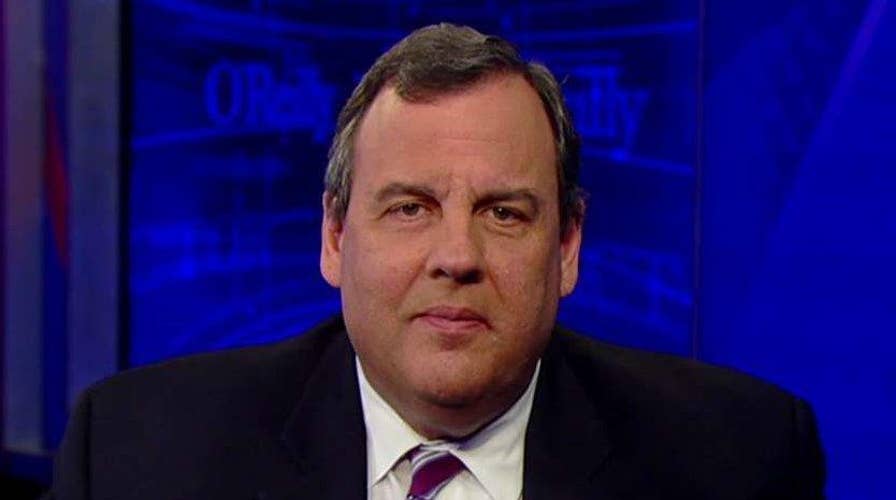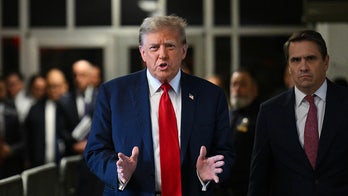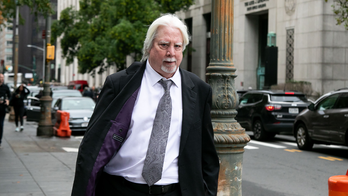Chris Christie critical of travel ban rollout
New Jersey Governor joins 'The O'Reilly Factor' to discuss President Trump's executive order
TRENTON, N.J. – Republican Chris Christie's final budget as New Jersey governor has not yet passed through the Democrat-controlled Legislature, but already fiscal woes that could result in program cutbacks or higher taxes are on the horizon for whoever who succeeds him.
Christie unveiled a $35.5 billion 2018 spending blueprint on Tuesday without proposing tax increases or slashes to programs, but tax cuts enacted under his watch, a ballooning pension payment and mandated education spending will saddle his successor with challenging budget decisions.
Christie can't run for re-election because of term limits. None of the leading Democratic and Republican candidates running to succeed him has unveiled his or her own prospective budget. While they've already begun to signal how they might approach the looming problems, it's difficult to tell exactly how they would balance the budget.
A closer look at the issue:
WHAT'S THE PROBLEM?
Topping the list of issues is an estimated $1.1 billion hole from the reduction of the sales tax and phase-out of the estate tax that Christie and lawmakers agreed to last year as part of a deal on funding transportation.
Next year's budget will also confront the prospect of a roughly $1.5 billion increase in the pension payment, if the current schedule is adhered to. And then there's the school-spending formula approved by the Supreme Court that Christie failed to fund over seven years to the tune of about $1 billion a year.
There's also significant uncertainty surrounding what could happen to federal aid the state gets, including more than $4 billion a year from the expansion of Medicaid as part of the Affordable Care Act. President Donald Trump and Republican-led Congress promise to repeal and replace the law.
CHRISTIE: TRUMP MADE ME ORDER MEATLOAF AT WHITE HOUSE DINNER
"I think everybody across the board recognizes we have some tough fiscal challenges ahead," said New Jersey Chamber of Commerce executive vice president Michael Egenton. "If it's going to be a constructive dialogue, people are going to have to come to the table."
CANDIDATES SAY WHAT?
The unappetizing reality of balancing the budget, which the state constitution requires, contrasts sharply with sometimes vague campaign slogans. It's also politically convenient for both Democrats and Republicans to rip Christie, whose job approval is the lowest it's ever been. Still, it's possible to connect some dots.
Democratic front-runner Phil Murphy has said he opposed the estate tax cut but stopped short of calling for repeal and said he would apply the school-funding formula. Democratic Assemblyman John Wisniewski backs increasing taxes on millionaires as a way to close some of the gaps and ending the estate tax cuts, but he's also proposed tuition-free college for families earning under $125,000 a year, which would carry some cost. Former Clinton administration treasury official Jim Johnson also would apply the school-funding formula, and says he would partially reinstate the estate tax.
JUDGE: BRIDGE CASE COMPLAINT AGAINST CHRISTIE CAN GO FORWARD
On the Republican side, Lt. Gov. Kim Guadagno said in an emailed statement to The Associated Press that budget shortfalls should be handled through cuts and savings, not higher taxes. Assemblyman Jack Ciattarelli has called for a number of tax cuts including phasing out the corporate business tax, which would burden the state budget by about $260 million a year over 10 years under his plan.
WHERE DOES THIS LEAVE VOTERS?
Budget experts on the left and the right say New Jersey residents can expect a few tough years ahead.
"I think for the average New Jerseyan who's probably grappling with property taxes, who won't see noticeable relief from the sales tax reduction and who won't ever pay the estate tax, they have to be wondering what's going on," said Jon Whiten, vice president of the liberal think tank New Jersey Policy Perspective. "This is a hole that's been dug for years. It's unrealistic to expect we'll be out of that hole (quickly.)"
That means undoing the estate tax cut and likely enacting increased taxes on high-income earners, he said.
But the estate tax and sales tax cuts were smart moves that could keep more families staying in the state, according to Michele Siekerka, head of the New Jersey Business and Industry Association.
"We expect a few austere years," she said. "No matter who becomes our next governor, we would hope the focus remains on keeping the state affordable for taxpayers."





